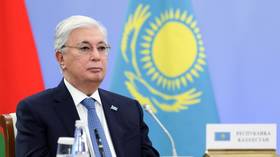People angry at unfair distribution of wealth – Israeli activist
As more massive anti-government demonstrations rock Israel, activist Yanina Lebed told RT that people across the country have realized they have common goals, and this is the biggest challenge Prime Minister Netanyahu is facing.
Israel has always been a divided country, says Yanina Lebed, an activist with the Jaffa Convention, which campaigns for equality between Israel's Jewish and Arab citizens. The nation is split into religious and secular communities; people from different countries of origin; and – the most bitter fracture of all – the Jewish majority opposes the Arab minority. An idea that could unite such a spectrum of people is hard to imagine, but “the worsening of the economic situation is such that every single person feels it on their own pockets, on their daily lives,” said Lebed, adding that the financial situation in the country has been in decline since Prime Minister Netanyahu came to office. At first, the protest did not win the hearts of the media said Lebed, speaking from Tel-Aviv, where the biggest anti-Netanyahu rally yet is due to start in a matter of hours. “This protest, that started here, in the center of Tel-Aviv, initially raised many doubts in the press and among the people: whether it is genuine, whether people in Tel-Aviv, which is basically the most liberal and richest city in Israel, can represent all of the people. But in the end, people across the country, almost in every city, realized they do one and the same thing,” she said. “So this is the biggest challenge Prime Minister Netanyahu is facing.”The activist blames the bloated military budget and unfair distribution of state finances for the current discontent. “When you spend so much money on controlling other nations, when you spend so much money on different defenses, then of course you have less money for welfare, for housing, for education, for culture, for anything else,” said Lebed.“In Israel, the budget is not being distributed equally between the settlements and normal cities. People eventually feel that they are being discriminated [against]. People in the settlements need more expense on their defense, on many other things,” she added.The protest in Israel has been inspired in part by the Arab Spring, believes Lebed. People have realized the nation is the basis of the government’s legitimacy and that people can bring change, she concluded.
According to independent journalist and blogger Noam Sheizaf, the Israeli government did not expect protests on this scale in the country, and does not at present have a blueprint for tackling the crisis. “I do not think the government has a real policy vis-à-vis these protests right now,” he said. “I think that Netanyahu is mainly improvising and he has yet to come up with something that would satisfy the needs of the protesters.” Noam Sheizaf said that at this point the government is busy making excuses for itself. “At the beginning it was an attempt to portray this as something that only happens in Tel Aviv – a bunch of spoiled kids. But when the protest spread around the country, then the new talking point is that the protesters have some serious issues but it is not this government’s fault,” he said. The journalist expressed doubts over the present government’s ability to resolve the principal challenges they are facing. “Netanyahu is the politician most identified with New Liberalism in Israel, both in his first term as Prime Minister and as Finance Minister at the beginning of the previous decade, so this is really personally about Netanyahu,” Noam Sheizaf concluded.














